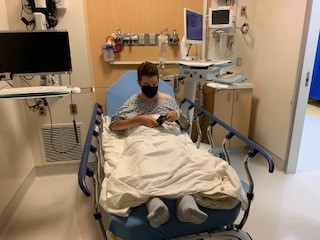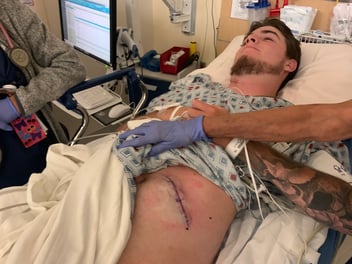Getting A Baclofen Pump
About two months ago, I went in to get surgery for a baclofen pump.
Ever since my injury happened back in 2010, I have been dealing with crazy out-of-control body spasms. Early on in my injury, the doctors told me they would eventually go away or subside. They never did and slowly got worse. Finally, the spasms became so strong that they would cause me to fall out of my wheelchair.

Nighttime became very difficult because my legs would kick up to my chest and then fall over to the side. Every time this happened, I would have to call for my mom in the middle of the night to help straighten my legs back out. This would happen multiple times throughout the night. Eventually, we came up with the idea to tie my legs down so they couldn’t kick up. I would use motorcycle tie-downs to go over my knees to prevent them from kicking up during the night. Unfortunately, my spasms would also wake me up in the middle of the night and make it difficult to fall back asleep.
I first heard about the baclofen pump a few years ago but wasn’t interested because it was an invasive surgery, which means they put it in your body. There was no way I was going to put something in my body before trying alternative options. Years later, nothing worked, still dealing with crazy body spasms and trying other medications to calm them down. After running out of all my other options, I decided to go through and get the baclofen pump. The baclofen pump is about the size of a hockey puck and goes underneath the skin on the left or right side of your stomach. It has a catheter connected to it, and the other end goes around your side and connects to your spine. The pump is filled with liquid baclofen, and it releases a small amount every day that goes directly to your spine.

I had many concerns thinking about this device. Would I feel the pump underneath my skin? Would I feel the catheter in my spine? Would the pump completely take away all my spasms? Would I still be able to stand? On the one hand, my spasms were annoying and out of control, and on the other hand, they kept a lot of my muscles from atrophying. Even though I couldn’t control the spasms, they would make my muscles work. I had many thoughts going through my head, questioning whether this was the right choice for me. In the end, I decided to go through with getting the pump. My spasms would control my daily living, and it became too much. I also was in the process of learning to drive and knew my spasms would prevent me from driving on my own. After a little over two months of having the pump, I can honestly say it has been life-changing for me.
The surgery went great, and I had a quick recovery. The first week was tough, but after that, it got better. I still have spasms, but they aren’t nearly as intense as they used to be. I like having some spasticity. For the first time in 10 years, I don’t have to tie my legs down at night. It was a surreal feeling not having my legs kick up constantly throughout the night after dealing with it for a decade. The pump doesn’t bother me, and I don’t feel it underneath my skin. I am able to drive now without worrying about having a bad spasm behind the wheel. I am on a lower dosage of baclofen than I was when I was taking it orally. I go in every 3-4 months to refill the pump.
All of the worries and anxiety I had before the procedure never happened. I am so happy I got the pump, and I would have gotten it much sooner if I knew how it would have helped me. The baclofen pump has truly changed my life for the better. I made a YouTube video about my procedure and experience if anyone is interested in checking it out.
Join Our Movement
What started as an idea has become a national movement. With your support, we can influence policy and inspire lasting change.
Become an Advocate